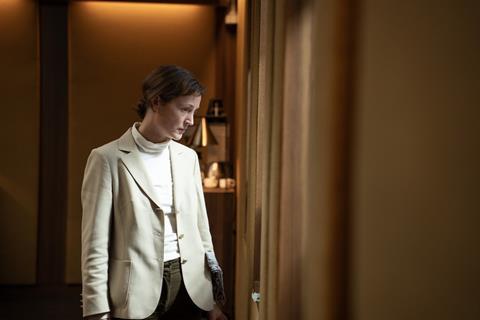Unwieldy feature presents a fictional Irish trial for the real-life 1996 murder of the French film producer

Dir/scr: Jim Sheridan, David Merriman. Ireland/Luxembourg. 2025. 89mins.
It is one of the most notorious unsolved crimes in Irish history. French film producer Sophie Toscan du Plantier was murdered outside her West Cork holiday home on December 23, 1996. Journalist Ian Bailey was named as the main suspect, but never faced trial in Ireland. He was, however, tried and found guilty in absentia by the French authorities, but subsequent extradition requests were denied. This unwieldy blend of fact and fiction imagines what might have been, had Bailey (played here in a dialogue-free appearance by Colm Meaney) faced trial in Ireland.
The film’s central conceit is both its strength and its weakness
Opening Galway after premiering in Tribeca, the film, co-directed by Jim Sheridan (who also appears as the jury spokesman) and David Merriman, is a boldly unorthodox attempt to shed light on the flawed police investigation through the means of a fictionalised jury debate. However, this device gets in the way of any in-depth examination of the case. Given the sensitivity of the subject matter, it might have been better served by a more conventional documentary.
Despite having taken place nearly 30 years ago, the murder of Toscan du Plantier still exerts a fascination, both in Ireland and France. It is a preoccupation that five-time Oscar nominee Sheridan evidently shares. Before this project, he worked on a long-gestating Sky documentary series about the case, titled Murder At The Cottage: The Search For Justice For Sophie. It was also announced at the beginning of this year that the cold case was set to be reopened, this time with the FBI casting an eye over the evidence.
Bailey, who died in January 2024 at the age of 66, maintained his innocence to the end. But, as the starting point of this picture suggests, he is still the main suspect. Interest in the case, and appetites for true crime content in general – together with the presence of Vicky Krieps in a central role – may help draw audiences to the picture at further festival screenings. Going forward, the claustrophobic, almost entirely single room, setting and clunky, laboured structure may mean the film is better suited to a streaming platform release rather than making its case in the overcrowded theatrical market.
Re-creation opens with a closing statement, emphatically delivered by the prosecuting barrister (Aidan Gillen). It seems unequivocal, a clear and damning assessment of Bailey’s guilt. What possible doubt could there be? All but one of the jurors in the discussion that follows is convinced he should be found guilty of the crime. The holdout – juror number eight (Krieps) – is not, at first, particularly persuasive in expressing her doubts. She has “a feeling”, she says. Juror three (John Connors), the most voluble in his angry certainty about Bailey’s guilt, sneers derisively: “Facts don’t care about feelings.” But how much of the case against Bailey IS fact? And how much is supposition based on circumstantial evidence that has been marshalled in the service of a foregone conclusion?
As the film unfolds and tempers within the jury chamber grow ever more heated, the balance tips gradually and the jury majority moves towards a not-guilty verdict. Each piece of evidence is examined in detail, and the seemingly solid case for the prosecution starts to crumble.
The film’s central conceit is both its strength and its weakness. The device of an imagined court case adds a fresh perspective and a new angle with which to approach the true crime genre. The film takes as its basis actual witness statements and genuine evidence. But the addition of fictional characters, whose fictional life events are woven into their decision-making processes, muddies the film and undermines the insights into the case.
Added to this is the somewhat manipulative way in which the opposing viewpoints are couched. Krieps’ juror eight character is empathetic, elegant and the granddaughter of a holocaust survivor. Juror three, on the other hand, is depicted as an aggressive, rage-filled, misogynist troll. It is abundantly clear which side of the argument the audience is intended to support.
Production companies: Hell’s Kitchen, Joli Rideau Media
International sales: Latido Films juan@latidofilms.com
Producers: Fabrizio Maltese, Tina O’Reilly
Cinematography: Carlo Thiel
Production design: Christina Schaffer
Editing: Jack Thornton
Music: Anna Rice
Main cast: Vicky Krieps, Jim Sheridan, Aidan Gillen, Colm Meaney
























